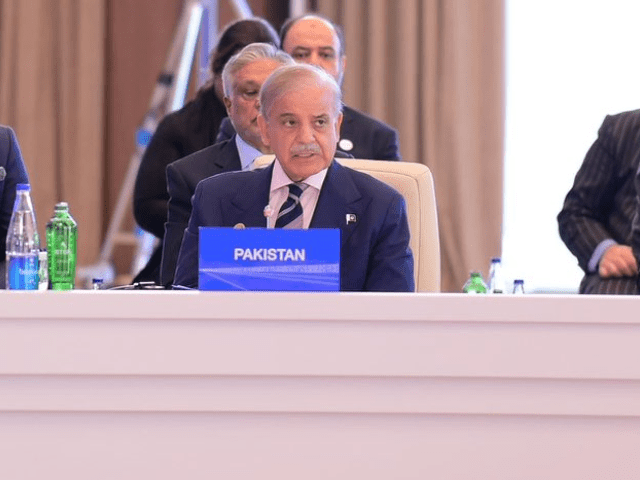Islamabad:
Prime Minister Shehbaz Sharif warned on Friday that India’s weapons of water represent a “new and alarming trend” in its hostility to Pakistan and calls it an aggression that must not be tolerated under any circumstances.
The Prime Minister, who approached the 17th Economic Cooperation Organization Organization (ECO) in Azerbaijan, condemned India’s recent actions after his military escalation earlier this year.
He thanked ECO Member States for having stood in solidarity with Pakistan in the midst of New Delhi’s aggressive steps, including the unilateral suspension of the Indus Waters Treaty, diplomatic downgrades and border endings.
Tensions rose after India accused Pakistan of orchestrating on April 22 -attack in Pahalam, leaving 26 people died – an allegation Islamabad is categorically rejected as baseless.
Read more: Pakistan, Iran confirms commitment to bilateral connections on the sidelines of ECO SUMMIT
The crisis peaked in early May as Missil hits targeted cities over Punjab and Azad Jammu and Kashmir, resulting in dozens of civilian losses. Pakistan responded with Operation Bunyanum Marsoos and beat Indian military installations. A US-broken ceasefire was announced on May 10th.
When he highlights the regional effect of India’s actions, prime minister New Delhis criticized the World Bank-mediated Indus Waters Treaty and its ignoring a decision of the permanent arbitration court and called both actions unacceptable.
“The waters of the indus are the lifeline of Pakistan’s 240 million people,” he said. “Under no circumstances can India be authorized to pursue this dangerous path that will constitute an act of aggression against the population of Pakistan.”
When he turned to economic cooperation, Prime Minister Shehbaz emphasized the need to improve trade and investment to increase regional connection. He noted that the ECO trade agreement, which agreed to the 13th ECO top meeting in Islamabad in 2017, remains unimplioned despite the passage of significant time.
He also approached the devastating effect of climate change with reference to the floods of 2022, which affected over 33 million people, destroyed infrastructure and caused financial losses of over $ 30 billion.
The premiere called on regional cooperation to tackle climate risks proposing low emission transport corridors, a regional carbon market platform and disaster resistance systems.
He also called for a dedicated framework to mobilize climate financing, develop pure energy corridors and promote eco-tourism to sustainable and inclusive growth.
By condemning the recent Israeli strikes over Iran and the continued violence in Gaza, Prime Minister Shehbaz both described as threats to regional peace.
He repeated Pakistan’s firm attitude towards violence and oppression all over the world and said, “We are united against those who commit barbaric acts against innocent people – whether in Gaza, Indian illegally occupied Jammu and Kashmir (IIOJK) or Iran,” he said.
بined
– Pakistan’s government (@govtofpakistan) July 4, 2025
The Prime Minister extended his gratitude to Azerbaijan’s President Ilham Aliyev to host the Khankendi summit and recognized the eco -secretariat’s efforts to promote regional cooperation.
He also thanked the people and the government of Azerbaijan for their warm hospitality and confirmed Pakistan’s commitment to regional peace and development.
PM Shehbaz expressed appreciation that Lahore was appointed ECO Tourism Capital for 2027, where he expanded an invitation to all Member States to visit Pakistan’s cultural heart. He further congratulated Kyrgyzstan and Tadsjikistan for being elected to 2028 and 2029 respectively.
ALSO READ: PM arrives at Azerbaijan to 17. Eco -Top Meeting
The premiere approved Uzbekistan’s strategic objective cooperation 2035 and called on Member States to unite in the light of global challenges and to channel collective efforts to economic prosperity and peace.
“Let us unite to face global challenges, direct our energies towards the future and guarantee progress and prosperity for our people,” he said.
The Economic Cooperation Organization established in 1985 by Iran, Turkey and Pakistan has since expanded to include Afghanistan, Azerbaijan, Kazakhstan, Kyrgyzstan, Tadsjikistan, Turkmenistan and Uzbekistan. The block with 10 members aims to promote economic, technical and cultural cooperation in Central and South Asia and the Middle East.



